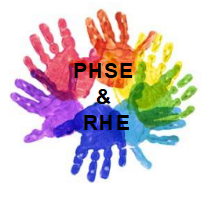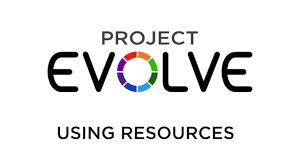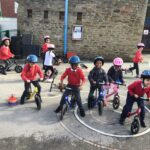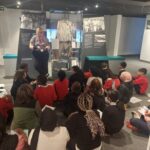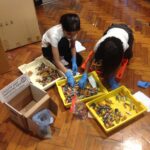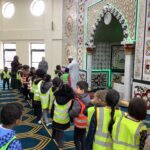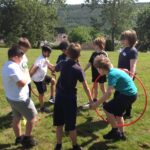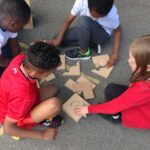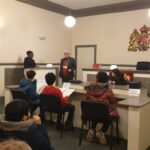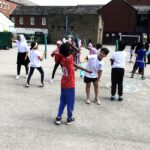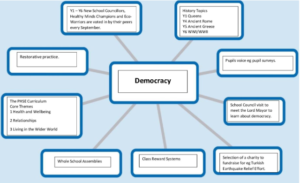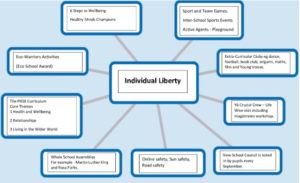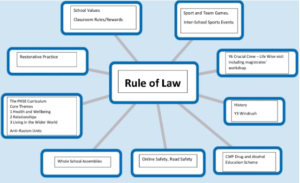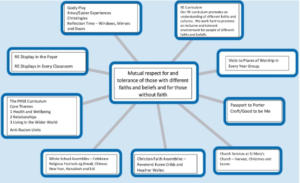INTENT - OUR VISION FOR PSHE
The teaching of PSHE underpins our school aims that each child will
Grow in wisdom: enabling discipline, confidence and delight in seeking wisdom and knowledge, and developing talents in all areas of life.
Have hope and aspiration: enabling healing, repair and renewal, coping wisely when things go wrong, opening horizons and guiding people into ways of fulfilling them.
Value community: a core focus on relationships, participation in communities and the qualities of character that enable people to flourish together.
Have a sense of dignity and respect: the basic principle of respect for the value and preciousness of each person, treating each person as a unique individual of inherent worth.
Have a good understanding of fundamental British Values: enabling understanding of democracy, individual liberty, rule of law and mutual respect for those of other faiths and beliefs.
At Porter Croft, we are very aware of the important role the PSHE curriculum has in supporting school to safeguard our children, to promote British Values and to implement the 9 protected characteristics of The Equality Act 2010. Our intent is to implement a PSHE curriculum, which develops learning, and results in the acquisition of knowledge and skills, which enable children to access the wider curriculum, work collaboratively with others and make a positive contribution to the life of the school and the wider community. Our intent is also to prepare our children for life in a diverse society and for the opportunities, responsibilities and experiences for later life. Teaching and learning in the classroom shows progression across all Key Stages within the PSHE core themes: Relationships, Living in the Wider World and Health and Wellbeing. The work in each year group builds on the knowledge and skills taught previously to allow children to acquire further knowledge and to know more and remember more. We expect teachers to use a PSHE programme to equip pupils with an age-appropriate, sound understanding of risk, with the knowledge and skills necessary to make safe and informed decisions and to recognise the importance of their own mental health and well-being. Our PSHE curriculum incorporates an age appropriate understanding of Relationships and Sex Education (RSE) and Health Education, as set out in the statutory guidance, enabling all children to be safe and to understand and develop healthy relationships both now and in their future lives.
IMPLEMENTATION
PSHE Scheme of Work
PSHE-RHSE Curriculum map 2024-25
At Porter Croft we have adopted the agreed Sheffield RSHE scheme of work which has been developed in accordance with Relationships Education, Relationships and Sex Education (RSE) and Health Education Statutory Guidance 2019 and the PSHE Association scheme.
This Scheme of Work is progressive and is split into the three core themes of Relationships, Living in the Wider World and Health and Wellbeing. ‘Relationships’ is further divided into the strands of Family and Friends. ‘Living in the Wider World’ is split into the strands of Our Communities and Online Safety and ‘Wellbeing’ is divided into the three strands of Mental Wellbeing, Physical Health and Growing Up. Each of the strands is taught in every year group over the course of an academic year.
Through relationships education, we teach pupils the knowledge they need to recognise and to report abuse. This is delivered by focusing on boundaries and privacy, ensuring that our children understand that they have rights over their own bodies. We teach pupils to seek advice when they suspect or know that something is wrong.
In terms of health education, children are taught about the characteristics of good physical health and mental wellbeing. Pupils are taught about the benefits and importance of daily exercise, good nutrition and sufficient sleep, they are provided with the language and knowledge to understand the normal range of emotions that everyone experiences. Children are also taught to articulate how they are feeling, and to develop the language to talk about their bodies, health and emotions.
Children are taught simple self-care techniques, personal hygiene, prevention of health and wellbeing problems and basic first aid. From Y1 children learn about health and personal safety with a focus on medicines and substances found in most homes. Y3 and Y4 cover smoking and alcohol. This includes understanding why people use these legal drugs, the effects they have on our bodies and how to resist use. From Year 5 onwards the children will focus on legal and illegal substances. In Y5 and 6 children are taught about puberty and the changing adolescent body.
In addition to the Sheffield RSHE scheme the PSHE curriculum is supplemented by CWP units on drugs and alcohol (Y1 – medicines, Y2 – keeping safe, Y3 – smoking, Y4 – alcohol, Y5 – legal and illegal drugs and Y6 – preventing use). We also teach first aid through the British Red Cross materials (Y1 – burns, Y2 – asthma, Y3 – bleeding, Y4 – broken bones, Y5 – head injuries/unresponsive and breathing and Y6 – choking/unresponsive and not breathing).
Additional PSHE Curriculum Units (EYFS – Y6)
From EYFS onwards we use the ‘No Outsiders’ materials and books to teach about accepting difference. The No Outsiders scheme uses over 42 picture books to teach about difference and equality, that is six different books for each year group. In EYFS - Y2, we use picture books where characters are different, and we show that they are also friends, and they play together. The characters in the books reflect our school’s diversity, in the hope that children will see themselves reflected in the books. In Y3 – Y6, we explore reasons why some people might feel left out. We also discuss issues such as prejudice and discrimination, and the fact that children may experience prejudice or discrimination at some point in their lives. We need to prepare them, give them confidence to disagree when they hear prejudice, and show them that they are not alone. The materials give children the language to challenge prejudice and show acceptance. These materials are linked to the Protected Characteristics.
Online safety is taught from EYFS to Y6 through the Project EVOLVE curriculum. This curriculum has been written by the team at the UK Safer Internet Centre and provides resources for each of the 330 statements from the UK Council for Internet Safety's (UKCIS) framework “Education for a Connected World”. The Project EVOLVE curriculum is divided in the following 8 strands – self-image and identity, online relationships, online reputation, online bullying, managing online information, health, well-being and lifestyle, privacy and security and copyright and ownership. Each strand is taught in every year group and the content of the strands develops progressively from the EYFS to Y6.
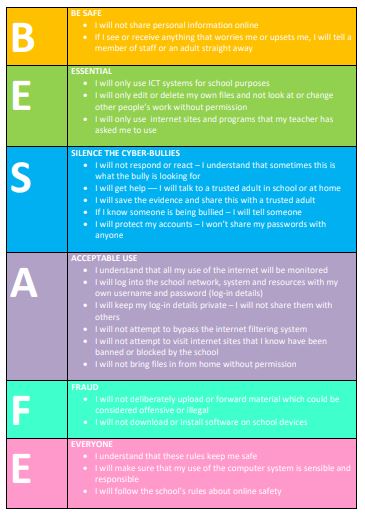
Curriculum for Personal, Social and Emotional Development (EYFS)
Curriculum for Personal, Social and Emotional Development (EYFS)
The EYFS curriculum is designed to support personal, social and emotional development (PSED). Through the curriculum, children learn to get on with others and make friends, understand and talk about feelings, learn about 'right' and 'wrong', develop independence and ultimately feel good about themselves.
Children's early PSED has a huge impact on their later well-being, learning achievement and economic success too.
PSED is one of the three prime areas within the Early Years Foundation Stage (EYFS). Each prime area is divided into early learning goals, for PSED these are:
- Self-Regulation - Show an understanding of their own feelings and those of others, and begin to regulate their behaviour accordingly, - Set and work towards simple goals, being able to wait for what they want and control their immediate impulses when appropriate; Give focused attention to what the teacher says, responding appropriately even when engaged in activity, and show an ability to follow instructions involving several ideas or actions.
- Managing Self - Be confident to try new activities and show independence, resilience and perseverance in the face of challenge; Explain the reasons for rules, know right from wrong and try to behave accordingly; Manage their own basic hygiene and personal needs, including dressing, going to the toilet and understanding the importance of healthy food choices.
- Building Relationships - Work and play cooperatively and take turns with others; Form positive attachments to adults and friendships with peers; Show sensitivity to their own and to others' needs.
The curriculum in EYFS is structured around a range of core texts which are used to underpin the three prime areas outlined above. From the Early Years onwards teachers talk explicitly about what makes for healthy friendships, family relationships and other relationships which young children are likely to encounter. This enables pupils to form a strong early understanding of the features of good relationships and to recognise any less positive relationships when they encounter them.
Curriculum Enrichment
Every year we also provide enrichment opportunities to support the teaching of PSHE, such as ‘Passport to Porter Croft’, ‘Local Community Week’ and ‘Healthy Body and Mind Week’. We also acknowledge international and national awareness days/weeks such as Internet Safety Day and Black History Month. Trips and visits also support the PSHE curriculum with visits to places of worship in every year group.
Curriculum Enrichment
Every year we also provide enrichment opportunities to support the teaching of PSHE, such as ‘Passport to Porter Croft’, ‘Local Community Week’ and ‘Healthy Body and Mind Week’. We also acknowledge international and national awareness days/weeks such as Internet Safety Day and Black History Month. Trips and visits also support the PSHE curriculum with visits to places of worship in every year group.
Inclusion
All PSHE lessons/activities are designed and planned to include all children through a range of approaches. Lessons are planned to facilitate the best possible outcomes for all children within the class.
School Values
Alongside understanding the importance of self-respect and self-worth, we also support pupils to develop personal attributes through our School Values of koinonia, respect, humility, compassion, tolerance, thankfulness, forgiveness and a sense of justice. Our School Values are displayed prominently in every classroom and around school and are a core feature of both lessons and assemblies. Where appropriate explicit links are made between School Values and fundamental British Values.
We also provide planned opportunities for young people to undertake social action, active citizenship and voluntary service to others locally or more widely. We have a democratically elected School Council which meets regularly in order to enact change within school and provide a mechanism for pupil voice.
DEPARTMENT FOR EDUCATION STATUTORY GUIDANCE 2020
To find out more information about the Department for Education Statutory Guidance for Relationships and Sex Education (RSE) and Health Education click.
IMPACT OF OUR RSHE AND PSHE CURRICULUM
Impact
At Porter Croft, children demonstrate (at an age appropriate level)
– excellent behaviour for learning
– healthy and positive relationships with their peers and with school adults
– respect for themselves and others
– understanding of how to keep themselves safe at school, in the community and in the wider world (including online)
– understanding of how to keep themselves healthy and how to maintain positive mental health
– understanding of the physical and emotional aspects of PSHE
– a good understanding of the fundamental British Values of democracy, rule of law and Individual liberty and mutual respect for and tolerance of those with different faiths and beliefs, and for those without faith
Evidence from working walls, staff meetings, pupil conferences and lesson observations/drop-ins and are used to assess children’s knowledge and grasp of PSHE.
National data shows that children at Porter Croft perform in line with or above National Expectations and that children.
ADDITIONAL INFORMATION FOR PARENTS/CARERS
All PSHE lessons/activities are designed and planned to include all children through a range of approaches. Lessons are planned to facilitate the best possible outcome for all children within the class.
No Outsiders Curriculum
What is No Outsiders?
Our Vision: Inclusive education, promoting community cohesion to prepare young people and adults for life as global citizens.
Click on the link below to find out about the books which we use in Porter Croft.
USEFUL WEBSITES FOR PARENTS AND CARERS
Bereavement
NHS Bereavement: www.nhs.uk/mental-health/children-and-young-adults/advice-for-parents/children-and-bereavement/
CRUSE: www.cruse.org.uk/get-help/for-parents/how-to-help-a-child-or-young-person#parents
Bullying
Anti-Bullying Alliance: www.anti-bullyingalliance.org.uk
Bullying: www.bullying.co.uk/advice-for-parents
Divorce or Separation
NSPCC: www.nspcc.org.uk/keeping-children-safe/support-for-parents/separation-and-divorce/
Drugs, Smoking and Alcohol Education
NSPCC: www.nspcc.org.uk/keeping-children-safe/talking-drugs-alcohol/
Frank: www.talktofrank.com
Health
NHS Diet: www.nhs.uk/conditions/baby/weaning-and-feeding/young-children-and-food-common-questions/
Parent Zone Diet: www.parentzone.org.uk/article/healthy-eating-parents-guide
NHS Dental Care: www.nhs.uk/live-well/healthy-body/taking-care-of-childrens-teeth/
Great Ormond Street Hospital Sleep: www.gosh.nhs.uk/conditions-and-treatments/procedures-and-treatments/sleep-hygiene-children/
Mental Health
Young Minds: www.youngminds.org.uk
NSPCC: www.nspcc.org.uk/keeping-children-safe/childrens-mental-health/
Online Safety
CEOP ThinkUKnow: www.thinkuknow.co.uk/
Safer Internet: www.saferinternet.org.uk/advice-centre/parents-and-carers
NSPCC: www.nspcc.org.uk/keeping-children-safe/online-safety/
Get Safe Online: www.getsafeonline.org/
Racism
NSPCC: www.nspcc.org.uk/keeping-children-safe/support-for-parents/children-race-racism-racial-bullying/
UNICEF: www.unicef.org/parenting/talking-to-your-kids-about-racism
General Safety
Brake Road Safety: www.brake.org.uk/
Child sun and water safety: www.loveholidays.com/holidays/child-sun-and-water-safety-on-holiday/
ROSPA Water Safety: www.rospa.com/leisure-safety/water/advice/parents-water
Network Rail Safety: www.networkrail.co.uk/communities/safety-in-the-community/
British Red Cross: www.firstaidchampions.redcross.org.uk/primary/
Safeguarding
NSPCC: www.nspcc.org.uk/keeping-children-safe/support-for-parents/pants-underwear-rule/
Various
NSPCC: www.nspcc.org.uk/keeping-children-safe/support-for-parents/talking-about-difficult-topics/


